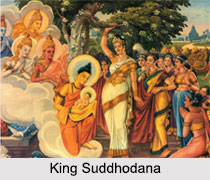 King Suddhodana was the father of Siddhartha Gautama, who later became "Lord Buddha", the founder of Buddhism. Suddhodana was the King of Kapilavastu and leader of Sakya people. According to Jataka stories, Suddhodana was Buddha"s father in many other births also. The name of King Suddhodana in other births was `Kattahari`, `Susimaa`, `Alinachitta`, "Bandhanagara", `Mahadhammapala`, "Kosambi", `Dasaratha`, `Maha Umagga`, `Hatthipala` and "Vessantara Jataka".
King Suddhodana was the father of Siddhartha Gautama, who later became "Lord Buddha", the founder of Buddhism. Suddhodana was the King of Kapilavastu and leader of Sakya people. According to Jataka stories, Suddhodana was Buddha"s father in many other births also. The name of King Suddhodana in other births was `Kattahari`, `Susimaa`, `Alinachitta`, "Bandhanagara", `Mahadhammapala`, "Kosambi", `Dasaratha`, `Maha Umagga`, `Hatthipala` and "Vessantara Jataka".
Family of King Suddhodana
King Suddhodana belonged to the dynasty of Sakya. His parents were King Sihahanu and Queen Kacchanaa. Suddhodana had four brothers named Dhotadana, Sukkodana, Sakkodana and Amitodana. The names of his two sisters were Amitaa and Pamitaa. Maya, the mother of Siddhartha Gautama was the chief consort of King Suddhodana. After Maya`s death, her sister Prajapati became his chief consort.
Legend of King Suddhodana and Lord Buddha
When Gautama Siddhartha was born, Sage Asita visited the newborn baby at the King"s court. He placed the baby"s feet on his head and worshipped the newborn Gautama. During the ploughing ceremony, Gautama was placed under the Jambu tree and Sage Asita worshipped him for the second time.
The astrologers predicted that the baby would either be a saint or a sovereign in his future sights. They foretold that Siddhartha would leave the material life in order to attain a spiritual life if he sees an old man, a diseased man, a corpse and a monk. Suddhodana tried his best to protect his son from seeing those sights that could encourage him to renounce his worldly life.
Gautama became a sage and attained enlightenment. When Suddhodana heard the news he sent a messenger with 10,000 companions to bring back Buddha to his own motherland in Kapilavastu. But the messenger and his companions were converted to monks when they met Buddha and could never return to their country. King Suddhodana then sent 9 more messengers for nine more times but none of them returned to the palace as they were all converted to the followers of Buddha. Finally, the King sent Kaludayi, who was a friend of Gautama and both of them were born on the same day. He too became a monk when he met Buddha but he kept his promise of conveying Suddhodana"s message to Buddha.
Buddha accepted the invitation of Suddhodana. When he visited Kapilavastu he stayed at Nigrodha Arama. Buddha went on to collect the alms as his usual routine. When this was reported to King Suddhodana he was extremely upset that his son was begging in the streets of the kingdom where he was the almighty ruler. Suddhodana met Buddha and wanted an explanation from him. Buddha convinced him and said that it was very common for a Buddha to beg. Suddhodana was satisfied by his answer. This satisfaction made king Suddhodana a "Sotapanna", a stream enterer who was to be born in the world for maximum seven times. At the Buddha"s discourse after his meals in the palace, Suddhodana became a "Sakidagami", one who could be born for maximum of one more time. When he heard Buddha"s Mahadhammapala Jataka, he became an "Anagami", one who is never going to take rebirth. Lastly, Suddhodana became an "Arahant" on his deathbed when Buddha came to visit him and teach him. Suddhodana thus died after becoming an Arahant.




















